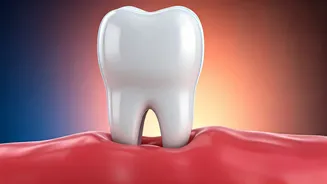Gum Disease Alerts
The health of your gums is often the first sign of trouble. Gingivitis, characterized by inflamed and bleeding gums, is the initial stage, frequently caused
by poor oral hygiene. If left untreated, it progresses to periodontitis, which can damage the bone that supports your teeth, potentially leading to tooth loss. Advanced gum disease has also been linked to an increased risk of heart disease, stroke, and diabetes. Paying attention to your gums, brushing and flossing regularly, and seeing your dentist for check-ups and professional cleaning is the key.
Diabetes: Oral Signs
Diabetes often presents itself in the mouth before other symptoms become apparent. Uncontrolled blood sugar levels can lead to increased susceptibility to gum disease, making it more severe and difficult to manage. People with diabetes may also experience dry mouth due to decreased saliva production, which increases the risk of tooth decay and infections. Additionally, delayed wound healing is common, which is also a cause for concern. Regular dental check-ups, along with good blood sugar control, are important for individuals with diabetes to maintain oral health.
Heart Disease Clues
The mouth can offer some clues about your heart health. Periodontal disease, mentioned earlier, is significantly associated with an increased risk of heart disease. The bacteria that cause gum infections can enter the bloodstream and contribute to inflammation throughout the body, including the cardiovascular system. This inflammation can exacerbate existing heart conditions or increase the risk of developing new ones. Furthermore, if you notice pain in your jaw or teeth, especially on the left side, it could be a symptom of angina. Prioritizing oral hygiene, quitting smoking and maintaining a healthy lifestyle all benefit your heart health.
Osteoporosis Impact
Osteoporosis, a condition that weakens bones, can affect the jawbone and lead to tooth loss. As the jawbone deteriorates, teeth can become loose and unstable. Bone density scans and dental X-rays can help detect bone loss. People with osteoporosis might experience difficulty in the mouth and may require extra care and attention during dental procedures. Adequate calcium and vitamin D intake are vital for maintaining bone health, including the jawbone. Your dentist can help monitor for these dental signs and provide recommendations to address any concerns.
Anemia: Oral Symptoms
Anemia, a condition characterized by a lack of healthy red blood cells, can show up in the mouth as well. Pale gums and tongue are common signs, signaling reduced blood flow and oxygen. Additionally, patients with anemia might experience a smooth, sore tongue due to a lack of iron, which is essential for healthy taste buds. Other indications of anemia include mouth sores and an increased susceptibility to infections. If you experience such symptoms, it's essential to consult both a dentist and a doctor to conduct a complete evaluation and prescribe treatment as necessary.
Acid Reflux Impacts
Chronic acid reflux (GERD) can wreak havoc on your teeth. Stomach acid, when it backs up into the esophagus and mouth, can erode tooth enamel, making teeth more prone to cavities and sensitivity. This erosion often occurs on the inner surfaces of the teeth, which are exposed to the acid. Furthermore, reflux can lead to bad breath and a sour taste in the mouth. It is recommended to manage acid reflux through dietary adjustments, medications, and lifestyle changes to safeguard your oral health. Regular dental check-ups are also crucial to monitor enamel loss and address any damage promptly.
Eating Disorders Effects
Eating disorders, like anorexia and bulimia, have profound effects on oral health. Frequent vomiting associated with bulimia exposes teeth to stomach acid, leading to severe erosion. Malnutrition, common in both anorexia and bulimia, can cause salivary gland swelling, dry mouth, and an increased risk of tooth decay and infections. These conditions often disrupt the natural flow of saliva, which is vital for protecting teeth. Addressing the underlying eating disorder is essential, along with comprehensive dental care to repair and prevent further damage. This includes restorative treatments and supportive therapies.
Vitamin Deficiencies Clues
Vitamin deficiencies can manifest in various ways in the mouth. Deficiencies in vitamin C can lead to bleeding gums, loose teeth, and impaired wound healing. Lack of vitamin B12 can cause a sore, red tongue. Insufficient vitamin D may impair calcium absorption, affecting bone density, including the jaw. To address these issues, it is imperative to eat a balanced diet or, if appropriate, take vitamin supplements under the guidance of a healthcare professional. Regularly consult a dentist and a doctor, as oral health concerns and vitamin deficiencies often go hand-in-hand.



















![[WATCH] 'Real Madrid, Ramadan and rest' - Mohammed Siraj how last-minute World Cup call-up changed February plan](https://g-mob.glance-cdn.com/public/fc/image/ByYT_LEmlrD0.webp)


